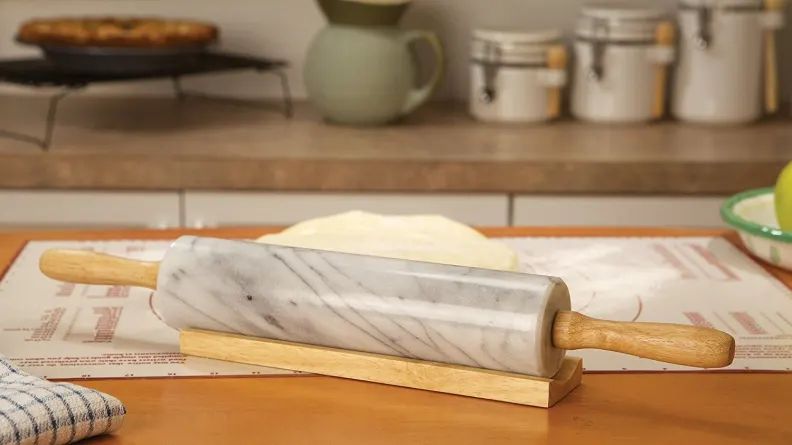Are Wooden Rolling Pins Hygienic?
Wooden rolling pins are a classic kitchen tool used for rolling and flattening dough. They are cylindrical rods typically made from hardwoods like maple, beech or ash. Rolling pins date back hundreds of years, with evidence of their use in ancient Rome. They allow cooks to efficiently roll dough to an even thickness for pies, cookies, pasta and more.
Wood became the dominant material for rolling pins because it is hard enough to flatten dough without sticking. The lack of porosity in wood also makes it easy to clean and sanitize. Wooden rolling pins remain popular today for baking enthusiasts and professional chefs alike due to their versatility, functionality and aesthetic appeal.
Wood Hygiene Considerations
One important consideration for the hygiene of wooden utensils like rolling pins is the porosity and moisture absorption of wood. Wood is inherently porous, meaning it has small holes throughout its structure that can allow it to absorb liquids (“Porous vs Non-Porous Surfaces in your Kitchen,” https://revivalrenovations.com/porous-vs-nonporous-surfaces/). This porosity makes wood more prone to absorbing moisture, bacteria and oils during use compared to non-porous materials like glass, metal or plastic.
However, some types of wood are less porous than others. Harder woods like maple and beech tend to be less porous and therefore more hygienic for kitchen use (“What is the hardest non-porous wood?,” https://www.reddit.com/r/woodworking/comments/13sep41/what_is_the_hardest_nonporous_wood/). Properly treating and caring for wooden utensils is also key for minimizing moisture absorption and bacteria buildup.
Proper Care for Wooden Utensils
Proper care is essential for ensuring wooden utensils like rolling pins remain hygienic and durable over time. The porous nature of wood requires some additional maintenance compared to other materials.
Oiling wooden utensils regularly helps seal the pores and prevent moisture and bacteria from being absorbed into the wood. Food-grade mineral oils like butcher block oil are commonly used. Oiling every 1-2 months is a good rule of thumb, or more frequently with heavy use.
Allowing wooden utensils to fully dry after each use is also important to prevent warping or cracking. Don’t let them soak in water, and hand wash gently. Store in a dry place. Any existing cracks or splinters in the wood should be sanded down to keep bacteria out.
Avoid putting wooden utensils in the dishwasher, as the high heat can damage the wood over time. The National Sanitation Foundation recommends hand washing wooden items with hot water and soap, then allowing to air dry [1].
Comparing to Other Materials
Wooden rolling pins have both advantages and disadvantages compared to rolling pins made from other materials like plastic, marble, glass, and various metals.
Plastic rolling pins are inexpensive and lightweight. However, they tend to warp easier, especially in heat. Plastic also has a tendency to retain odors and stains. Over time, plastic can degrade, scratch, or crack.
Marble rolling pins retain temperature well and have a smooth rolling surface. But they are very heavy, making them harder to work with. Marble can chip or crack if dropped.

Glass rolling pins are nonporous and hold temperature consistently. However, they are fragile if dropped or hit against a hard surface. Glass can also crack under extreme temperature changes.
Metal pins like aluminum, copper, or stainless steel are durable, hold temperature well, and have a smooth rolling surface. However, they tend to be heavy. Uncoated metals can also react with acidic ingredients. Metals pins require extra care to prevent rusting.
In comparison, wooden rolling pins are typically lightweight but sturdy. The porous nature of wood makes it less likely to dull knives during use. Wood also does not retain odors or stains. Quality wooden pins properly cared for can last for many years. The grip of wood is generally preferred by bakers over slippery surfaces like metal or glass.
Studies on Wood Hygiene
Scientific research has shown that wood has natural antibacterial properties. A comprehensive review published in the Journal of Food Science analyzed numerous studies on microbial safety of wood in contact with food. It found that many types of wood exhibit antimicrobial properties due to their chemical structure and physical properties that damage microbial cells on contact.
A study in the International Journal of Antimicrobial Agents tested the antimicrobial activity of oak, pine, and beech wood against common foodborne pathogens. All three species of wood showed significant antibacterial effects against E. coli, Listeria, and Salmonella. The researchers concluded that wood’s low moisture absorption, surface texture, capillary effect, and extractives all contribute to its antimicrobial properties.
Additional research published in Healthcare reviewed evidence showing wood’s antimicrobial effects against viruses, bacteria, and fungi. The hydrophilic and hydrophobic components in wood can damage microbial cells and inhibit their growth and colonization. The review recommends wood as a hygienic material for items used in healthcare settings.
Commercial Kitchen Use
Wooden utensils are regulated in commercial kitchens due to concerns about properly cleaning and sanitizing them to prevent bacteria growth. According to the FDA Food Code, wood and wood wicker cannot be used as food-contact surfaces in commercial kitchens.
Many health departments prohibit the use of wooden spoons, cutting boards, bowls and other utensils in professional kitchens. The concern is that bacteria can hide in cracks, cuts and pores in the wood and be difficult to fully sanitize (Source). While wooden items could technically be cleaned in a commercial dishwasher, the high heat cycles can damage and crack the wood over time.
Commercial kitchens follow strict regulations and avoid wooden utensils for food prep. Instead, common utensils are made from metal, plastic, silicone and other non-porous materials that can withstand the harsh cleaning chemicals and high heat required for sanitization. While wooden spoons are traditional, commercial kitchens prioritize food safety and hygiene over tradition.
Antibacterial Treatments
Wooden utensils and tools naturally contain antimicrobial properties due to the absorption and evaporation that occurs with wood. However, additional antibacterial treatments can provide extra protection and sanitization for wooden kitchen items.
Oils such as linseed oil, mineral oil, olive oil, and coconut oil can be used to treat and maintain wooden utensils. These penetrating oils soak into the wood, replacing lost moisture and enhancing the natural antibacterial properties. Periodic re-oiling is recommended, along with proper washing after each use.
Varnishes and finishes formulated for food contact can also help seal and protect wooden rolling pins, spoons, and boards. However, these may need to be reapplied over time as they can wear away with heavy use. Frequent oiling is generally preferred for items like spoons and spatulas.
Other disinfecting agents like vinegar, lemon juice, and hydrogen peroxide can occasionally be used for extra sanitizing, in addition to regular washing. However, harsh cleaners should be avoided, as they may degrade and dry out the wood over time.
Proper Sanitization
Wooden rolling pins can be thoroughly sanitized and kept hygienic with proper cleaning methods. According to The Kitchn (https://www.thekitchn.com/how-to-clean-a-frenchstyle-wooden-rolling-pin-cleaning-lessons-from-the-kitchn-205971), wooden rolling pins should be hand-washed with warm soapy water after each use. Allow the pin to air dry completely before storing. Periodically, the pin can be sanitized by wiping it down with a diluted vinegar solution consisting of 1 part vinegar to 3 parts water. Let the vinegar solution sit for 10-15 minutes before rinsing and drying the pin thoroughly.
To avoid contamination, wooden rolling pins should never be placed in the dishwasher, as the high heat can cause the wood to crack and split over time. It’s also important not to submerge wooden rolling pins in water for extended periods, as excessive moisture can lead to warping. Proper drying after washing is key. Store rolling pins in a clean, dry place. With regular cleaning and proper care, wooden rolling pins can be kept hygienic for food preparation.
Durability Considerations
Wooden rolling pins can last a long time if properly cared for. According to research from Serious Eats, wooden rolling pins made from hardwoods like maple can withstand years of regular use and cleaning. The main concern is the effect of cleaning over time, especially submerging in water or using harsh detergents which can degrade the finish and lead to cracking or warping.
To maximize durability, it’s recommended to hand wash wooden rolling pins with mild soap and warm water, drying thoroughly afterwards. Avoid soaking for long periods. Re-oil occasionally with food-safe mineral oil to maintain the protective finish. With proper care, a quality wooden rolling pin should remain sturdy and functional for many years of baking.
Conclusion
In summary, wooden rolling pins can be a very hygienic option for home bakers when properly cared for. The natural antibacterial properties of wood along with proper cleaning and sanitizing make it a durable, safe choice. While other materials like marble or silicone may be easier to sanitize, they lack the advantages of wood’s durability and non-stick properties.
Ultimately, the hygiene of any kitchen tool comes down to the cleaning habits of the user. As long as a wooden rolling pin is regularly washed, dried thoroughly, and occasionally sanitized, it poses minimal risk of bacterial growth or cross-contamination. With proper maintenance, a high-quality wooden pin can last for many years of safe baking use.




